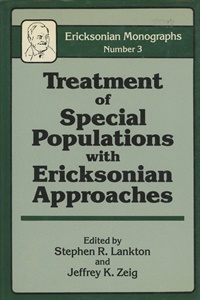Ericksonian Monographs 03 - Treatment of Special Populations with Ericksonian Approaches (Hardcover)
- Average Rating:
- Not yet rated
- Topic Areas:
- Not Available
- Author:
- Stephen Lankton, MSW | Jeffrey Zeig, PhD
- Copyright:
-
1988
- Number of Pages:
- 147
- License:
- Never Expires.
Tags: Ericksonian Monographs
Description
Description:
Book is used, but in good condition.
This is the third volume in the widely hailed series of Ericksonian Monographs sponsored by the Milton H. Erickson Foundation as a part of its expanding educational forum for mental health professionals.
The Ericksonian Monographs make available original work - theory, clinical technique, case material, and research - on the cutting edge of Ericksonian thought and practice. Ericksonian Monographs No. 3 includes a stimulating collection of papers from the Third International Congress on Ericksonian Approaches to Hypnosis and Psychotherapy. The unifying theme of this volume is the clinical use of Ericksonian approaches for various special treatment populations, including clients with phobias, pain, stuttering, autism, psychosis, and multiple personality disorder.
Marc F. Weiss begins the volume with an article on a patient's reactions to the use of Ericksonian hypnotherapy as a surgical analgesic. Thomas South describes using hypnosis as an anesthetic during a cesarean childbirth. Noelle M. Poncelet then focuses on the resources and techniques used by people who deal successfully with chronic pain.
John A. Moran illustrates with case examples five basic guidelines for presenting treatment to phobic clients. Bernhard Trenkle compares and contrasts the approaches of Charles Van Riper and Milton H. Erickson for treating adult stutterers. Next is Susan Mullarky's lively article on Ericksonian approaches with homosexuals and lesbians, followed by Keiichi Miyata's on treating autistic children. John H. Edgette focuses on the management of acute psychosis.
Clude Millette adapts a utilization approach to the treatment of a case of multiple personality disorder. G. Dean Bathel and Carlos R. Carreon also find utilization techniques helpful in cross-cultural work with Mexican American clients. Finally, Madeleine M. Richeport applies an anthropological understanding to transcultural issues in Ericksonian hypnotherapy.
While the aim of the Ericksonian Monographs is to reflect the growing influence and applications of the work of Milton H. Erickson, it must be remembered that Erickson himself disapproved of schools of therapy, believing that any school focuses on its own delimiting approaches as the "right" way and excludes others as the "wrong" way to do therapy. He felt that the individuality of the patient and of the therapist is foremost and emphasized that psychotherapy should be formulated to meet the uniqueness of the individual's needs. It is this spirit of intellectual freedom that inspires the Ericksonian Monographs as a vehicle that will contribute to the comprehensive and practice of effective therapy by therapists of many different theoretical schools.
Credits
Author

Stephen Lankton, MSW Related Seminars and Products
Stephen R. Lankton, MSW, is a Licensed Clinical Social Worker (LCSW) in Phoenix, Arizona. In addition to his extensive training in Gestalt Therapy, and Transactional Analysis, he studied regularly with Milton H. Erickson, M. D. from July 1975 through December 1979. He is the Editor-in-Chief of the American Journal of Clinical Hypnosis (since 2005) and a Life-Fellow of the American Society of Clinical Hypnosis (ASCH). He has maintained a private psychotherapy practice and trained therapists worldwide for five decades.
He is a Diplomate in Clinical Hypnosis, an Emeritus Clinical Member of the International Transactional Analysis Association (ITAA), and Past-President of the American Hypnosis Board for Clinical Social Work. He is on the teaching faculty of the Milton H. Erickson Foundation.
Steve has received two Lifetime Achievement Awards: the “Lifetime Achievement Award for Outstanding Contribution to the Field of Psychotherapy” from the Milton H. Erickson Foundation, and the “Lifetime Achievement Award for Contributions to The Field of Hypnosis” from the American Society of Clinical Hypnosis.
He served as Faculty Associate at Arizona State University (ASU) 2004-2008 and the ASU Graduate School of Social Work 2011- 2018 and was appointed by the Governor to the Arizona Board of Behavior Health Examiners where he served from 2009-2016 and was the Board Chairperson from 2014 to 2016.
He authored, co-authored, or edited 20 books on psychotherapy and hypnosis with translations in seven languages and over 68 chapters and peer reviewed articles including The Answer Within, and Tools of Intention and the recent “Chapter 8: States of Consciousness Model and Ericksonian Approaches to Hypnosis” in the Routledge International Handbook of Clinical Hypnosis.

Jeffrey Zeig, PhD Related Seminars and Products
Jeffrey K. Zeig, PhD, is the Founder and Director of the Milton H. Erickson Foundation and is president of Zeig, Tucker & Theisen, Inc., publishers in the behavioral sciences. He has edited, co-edited, authored or coauthored more than 20 books on psychotherapy that appear in twelve foreign languages. Dr. Zeig is a psychologist and marriage and family therapist in private practice in Phoenix, Arizona.


